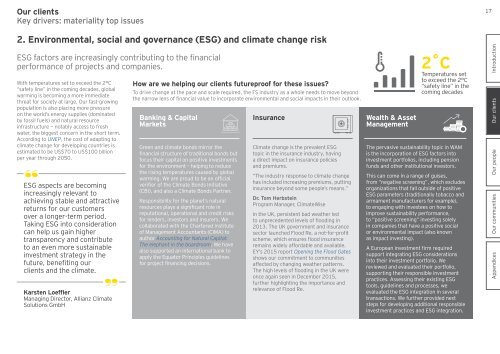Our journey towards sustainability
6049BmzMV
6049BmzMV
You also want an ePaper? Increase the reach of your titles
YUMPU automatically turns print PDFs into web optimized ePapers that Google loves.
<strong>Our</strong> clients<br />
Key drivers: materiality top issues<br />
2. Environmental, social and governance (ESG) and climate change risk<br />
ESG factors are increasingly contributing to the financial<br />
performance of projects and companies.<br />
With temperatures set to exceed the 2°C<br />
“safety line” in the coming decades, global<br />
warming is becoming a more immediate<br />
threat for society at large. <strong>Our</strong> fast-growing<br />
population is also placing more pressure<br />
on the world’s energy supplies (dominated<br />
by fossil fuels) and natural resource<br />
infrastructure — notably access to fresh<br />
water, the biggest concern in the short term.<br />
According to UNEP, the cost of adapting to<br />
climate change for developing countries is<br />
estimated to be US$70 to US$100 billion<br />
per year through 2050.<br />
ESG aspects are becoming<br />
increasingly relevant to<br />
achieving stable and attractive<br />
returns for our customers<br />
over a longer-term period.<br />
Taking ESG into consideration<br />
can help us gain higher<br />
transparency and contribute<br />
to an even more sustainable<br />
investment strategy in the<br />
future, benefiting our<br />
clients and the climate.<br />
Karsten Loeffler<br />
Managing Director, Allianz Climate<br />
Solutions GmbH<br />
How are we helping our clients futureproof for these issues?<br />
To drive change at the pace and scale required, the FS industry as a whole needs to move beyond<br />
the narrow lens of financial value to incorporate environmental and social impacts in their outlook.<br />
Banking & Capital<br />
Markets<br />
Green and climate bonds mirror the<br />
financial structure of traditional bonds but<br />
focus their capital on positive investments<br />
for the environment – helping to reduce<br />
the rising temperatures caused by global<br />
warming. We are proud to be an official<br />
verifier of the Climate Bonds Initiative<br />
(CBI), and also a Climate Bonds Partner.<br />
Responsibility for the planet’s natural<br />
resources plays a significant role in<br />
reputational, operational and credit risks<br />
for lenders, investors and insurers. We<br />
collaborated with the Chartered Institute<br />
of Management Accountants (CIMA) to<br />
author Accounting for Natural Capital:<br />
The elephant in the boardroom. We have<br />
also supported an international bank to<br />
apply the Equator Principles guidelines<br />
for project financing decisions.<br />
Insurance<br />
Climate change is the prevalent ESG<br />
topic in the insurance industry, having<br />
a direct impact on insurance policies<br />
and premiums.<br />
“The industry response to climate change<br />
has included increasing premiums, putting<br />
insurance beyond some people’s means.”<br />
Dr. Tom Herbstein<br />
Program Manager, ClimateWise<br />
In the UK, persistent bad weather led<br />
to unprecedented levels of flooding in<br />
2013. The UK government and insurance<br />
sector launched Flood Re, a not-for-profit<br />
scheme, which ensures flood insurance<br />
remains widely affordable and available.<br />
EY’s 2015 report Opening the Flood Gates<br />
shows our commitment to communities<br />
affected by changing weather patterns.<br />
The high levels of flooding in the UK were<br />
once again seen in December 2015,<br />
further highlighting the importance and<br />
relevance of Flood Re.<br />
Wealth & Asset<br />
Management<br />
2˚C<br />
Temperatures set<br />
to exceed the 2°C<br />
“safety line” in the<br />
coming decades<br />
The pervasive <strong>sustainability</strong> topic in WAM<br />
is the incorporation of ESG factors into<br />
investment portfolios, including pension<br />
funds and other institutional investors.<br />
This can come in a range of guises,<br />
from “negative screening”, which excludes<br />
organizations that fall outside of positive<br />
ESG parameters (traditionally tobacco and<br />
armament manufacturers for example),<br />
to engaging with investees on how to<br />
improve <strong>sustainability</strong> performance,<br />
to “positive screening” investing solely<br />
in companies that have a positive social<br />
or environmental impact (also known<br />
as impact investing).<br />
A European investment firm required<br />
support integrating ESG considerations<br />
into their investment portfolio. We<br />
reviewed and evaluated their portfolio,<br />
supporting their responsible investment<br />
practices. Assessing their existing ESG<br />
tools, guidelines and processes, we<br />
evaluated the ESG integration in several<br />
transactions. We further provided next<br />
steps for developing additional responsible<br />
investment practices and ESG integration.<br />
17<br />
Appendices <strong>Our</strong> communities <strong>Our</strong> people <strong>Our</strong> clients Introduction


